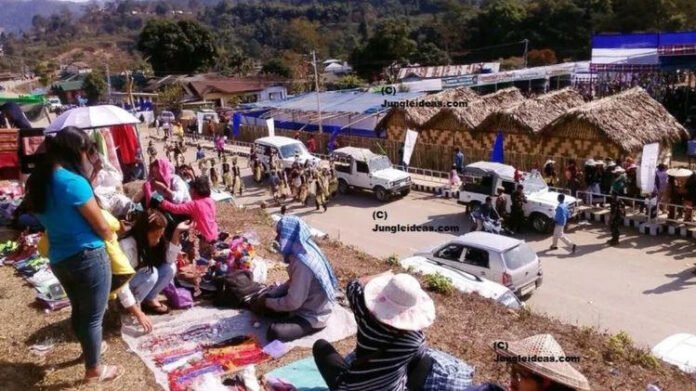The Kra Daadi district administration of Arunachal Pradesh has suspended weekly markets at Gilo Tabiang and Kudung with immediate effect. The decision comes amid rising concerns over law and order, public safety, and the need to maintain peace in the region, particularly in the wake of recent disturbances reported during market days.
The official notification, issued by the Deputy Commissioner’s office, stated that the suspension will remain in force until further notice. Authorities clarified that the step is precautionary in nature and is intended to prevent potential conflicts and ensure public order in these remote but economically vital areas.
Read More: Assam MLA Suren Phukan Faces Backlash Over Election Code Violation
Reasons Behind Market Suspension
According to district officials, recent intelligence inputs and field reports indicated a rise in tension during weekly market gatherings, particularly in Gilo Tabiang and Kudung—both of which are major hubs for local trade and social interaction. These markets attract people from various communities, including those from interior villages, which sometimes leads to friction due to unresolved local disputes and political undercurrents.
The administration cited incidents of verbal spats escalating into physical altercations, crowd mismanagement, and increased risk of unrest. With the fragile inter-community balance in the region, officials deemed it necessary to act before situations turned volatile.
“We have taken this decision in the larger interest of peace and harmony. Weekly markets will remain suspended until the situation stabilizes and we are confident that normalcy can be maintained,” a senior district officer stated.
Impact on Local Economy and Livelihood
Weekly markets in rural Arunachal, such as those in Gilo Tabiang and Kudung, play a crucial role in the local economy. Farmers, artisans, and small traders rely on these gatherings to sell their produce and goods, ranging from vegetables and grains to handmade tools and traditional items.
The suspension is likely to affect daily wage earners and small vendors who depend on market days for their income. However, the administration has assured alternative arrangements to minimize economic disruption. Temporary ration supply centers and controlled trade points are being considered to ensure that basic goods remain accessible to the public during the suspension period.
Officials are also working with local community leaders to devise strategies for restoring the markets in a controlled and secure manner, possibly under police supervision or with enhanced crowd management protocols.
Community Reaction and Support
While the decision has met with concern from traders and villagers, there is also widespread understanding of the rationale behind it. Many local leaders and elders have come forward in support of the district administration, urging residents to cooperate for the sake of communal harmony.
Speaking to local media, a village head from Gilo remarked, “Markets are important, but not at the cost of peace. We must work together to resolve disputes first, so that everyone can trade safely again.”
Civil society organizations in Kra Daadi are also urging calm and advising against spreading rumors or misinformation that could worsen tensions.
Way Forward: Ensuring Security and Rebuilding Trust
The Kra Daadi administration is planning a series of meetings with stakeholders, including youth groups, village elders, and law enforcement agencies, to discuss a roadmap for the safe resumption of weekly markets. Suggestions like setting up separate zones for different communities, appointing market marshals, and installing surveillance mechanisms are under active consideration.
In addition, public awareness campaigns around peaceful coexistence and community vigilance are being rolled out to strengthen trust and cooperation among diverse groups.
A Temporary Step Towards Long-Term Peace
The suspension of weekly markets at Gilo Tabiang and Kudung may appear to be a disruption, but it is a calculated move to prevent deeper conflict in one of Arunachal’s more sensitive districts. As the authorities work toward restoring normalcy and resolving underlying issues, the focus remains on community involvement, security reinforcement, and protecting livelihoods.
This development serves as a reminder that peace and commerce go hand in hand, and that proactive governance is essential to preserving both in a diverse and dynamic region like Arunachal Pradesh.




